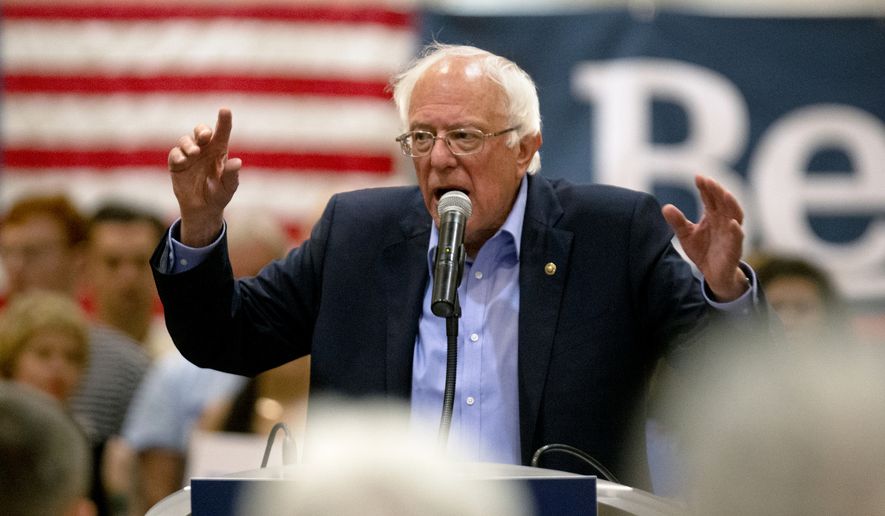Sen. Bernard Sanders proclaimed the dawn of democratic socialism in America on Wednesday, saying it’s time the country moves beyond the liberties enshrined in the Constitution and embraces a new set of human rights promises including free college education, guaranteed jobs and better retirements.
The Vermont independent and 2020 Democratic presidential hopeful cast his vision as part of a historical clash, comparing President Trump’s rise to that of Naziism in the 1930s.
He said just as President Franklin D. Roosevelt’s New Deal was the answer to corporate overreach and growing authoritarianism, so democratic socialism is the answer now.
“My message to you today is that if there was ever a moment in the history of our country where despair was not an option, this is that time,” he said. “If there was ever a moment when we needed a new vision to bring our people together in the fight for justice, decency and human dignity, this is that time.”
For Mr. Sanders, the speech at George Washington University was an attempt to redefine the battleground of the election two weeks before the first debate of the primary season.
He is also struggling to break free of the shadow of former Vice President Joseph R. Biden, who leads in polling, and is working to distance himself from a surging group of candidates, including fellow left-wing Sen. Elizabeth Warren.
Ms. Warren has eschewed the democratic socialist label, but Mr. Sanders said he will not shy away from it and has embraced it for all of his political career.
Now he just has to convince voters that it’s not as scary as it sounds.
On Wednesday, that meant deploying frequent pro-socialism quotes from Martin Luther King Jr. and former President Harry S. Truman, and wrapping himself in Rooseveltian rhetoric from the 1930s and 1940s. He said FDR began the work of democratic socialism only to die before he could see it through.
“Today I am proposing we complete the unfinished work of Franklin Roosevelt and the Democratic Party by putting forth a 21st-century economic bill of rights,” he said.
Where Roosevelt had his four freedoms — of religion and speech, and from fear and want — Mr. Sanders added six rights: “quality health care,” “as much education as one needs to succeed,” “a good job that pays a living wage,” affordable housing, retirement support and a clean environment.
“Are you truly free if you are unable to go to a doctor when you are sick?” he said. “Are you truly free because you are unable to go to a college or a trade school because your family lacks the income?”
Mr. Sanders is making his second run for president after falling short in the 2016 Democratic primary to Hillary Clinton.
In that race, he was dinged for running a campaign focused on ideology but lacking in political sophistication, including the coalition-building among the mosaic of minority communities that make up the Democratic Party.
Some analysts saw parallels between his anti-establishment message and that of Republican candidate Donald Trump, and indeed some voters said they could see themselves backing either man rather than establishment options such as Mrs. Clinton on the Democratic side or Republican candidate Jeb Bush.
Mr. Sanders, though, made clear Wednesday that he wants nothing to do with the forces that advanced Mr. Trump and his “xenophobic and authoritarian policies.”
He called the president a hypocritical oligarch who complains about socialism for the masses but enjoys “corporate socialism” for his own business interests.
The senator cast his economic vision as a salve to the racism, xenophobia and other divisiveness that he said springs from economic strife.
Mr. Trump has made clear he will try to use Mr. Sanders’ positions against Democrats no matter who their eventual nominee is.
“America will never be a socialist country,” the president declared during this year’s State of the Union address.
Other Republicans have echoed that call, saying if the 2020 election is fought over socialism, then their party will be in good shape.
Some of Mr. Sanders’ fellow Democrats agreed Wednesday.
“Sen. Sanders wants to dramatically reshape the entire economic model of the United States, which would be a huge mistake,” said former Rep. John Delaney, a Maryland Democrat who is competing with Mr. Sanders for the presidential nomination. “Socialism — or any new name Sen. Sanders has for it — is the wrong answer.”
Gallup polling shows most Americans think socialism is wrong for the U.S., but a majority of Democrats embrace the ideology.
Yet Mr. Sanders said the failures of “unfettered capitalism” are evident if Americans look for them.
He pointed to the life expectancy of a man in McDowell County, West Virginia, at 64 years, compared with a man in affluent Fairfax County, Virginia, at 82 years.
“While the rich get richer, they live longer lives. While poor and working families struggle economically and often lack adequate health care, their life expectancy is declining for the first time in modern American history,” he said.
• Stephen Dinan can be reached at sdinan@washingtontimes.com.




Please read our comment policy before commenting.